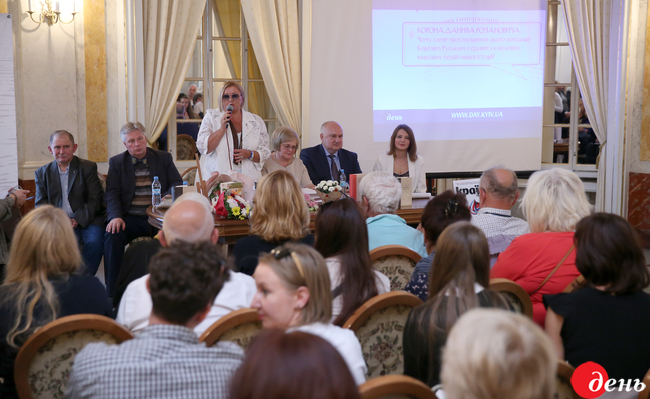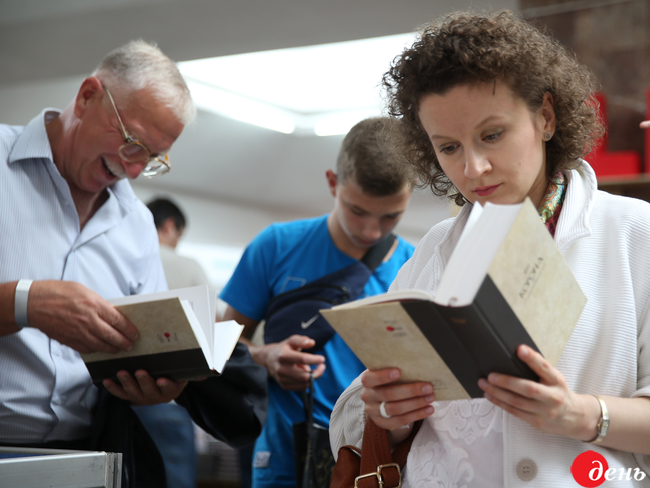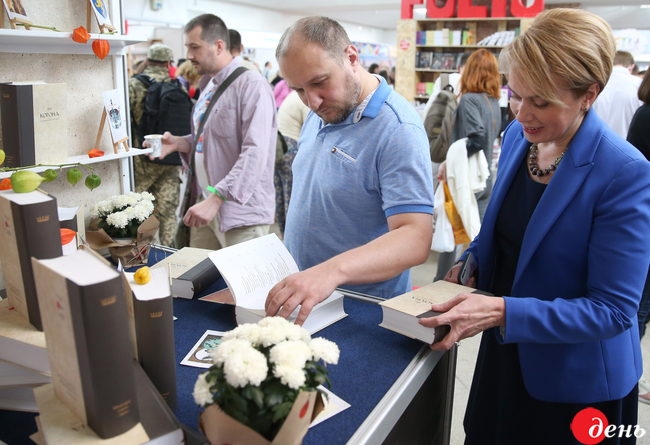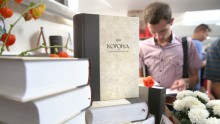For five days, from September 13 to 17, Lviv and the whole book-loving Ukraine lived in the rhythm of the 24th Publishers’ Forum, which is the oldest Ukrainian book fair. A total of 168 publishing houses were represented at the gathering. It featured a rich program with almost a thousand organized events. As usual, the Publishers’ Forum created a pleasant headache for every booklover, because every evening, they had to sit down peering into the program of the next day and planning where to go tomorrow. At the same time, the question arose: how to buy all the books that one so badly wants to add to one’s home library?
The most interesting events of the book fair were described by Den in detail as we are the general information partner of the Forum. Without a doubt, we will revisit this topic in the newspaper when publishing interviews taken during the Forum. However, now we would like to recall what these five days were like for Den’s team, which launched its new bestseller (now it is safe to call it that) The Crown, or Heritage of the Rus’ Kingdom within the framework of the Publishers’ Forum in Lviv.

“WE WORK TO CROWN ALL THAT WHICH IS ACTIVE AND ENERGETIC IN OUR PEOPLE”
For readers of Den, the culmination of the Forum came, of course, with the launch of this newspaper’s newest book. It was presented by its authors and the main inspiration and ideologue of the book, Den’s editor-in-chief Larysa Ivshyna. It was her speech that got mentioned and quoted by readers most frequently after the book launch. In particular, Ivshyna emphasized: “The last 25 years have been marked by major changes, turbulences, and clashes. In order to put urgent and relevant issues for society upright, we need a real jack. We finally have to talk about the essential things. When students of our Summer School of Journalism abandon their comfortable after-exam life and spend a month in the editorial office, and then contribute to the book creation process as well, I think it is a very encouraging sign. We wrote about King Danylo and his capitals Kholm, Volodymyr, and Halych with the help of our long-standing high-class contributors. But one of our contributors is a student interested in history. She went on a special research trip to Halych, talked with iconic people and eventually wrote a beautiful text. At the same time, well-known historian Yurii Tereshchenko wrote for us a brilliant treatise on the essence of the monarchical idea and its place in the political life of Ukraine. To someone it may seem exotic, but we live and make the newspaper in real life. But we also do not forget about the important things over which the generations of Ukrainians thought before us and for which the most advanced people of their time fought.

“Wilhelm Habsburg, known as Vasyl Vyshyvany, was abducted from Vienna by the NKVD in the late 1940s, which is not so long ago. He wanted to see Ukraine as a constitutional monarchy, like other European countries, whose standards we are striving for today. This is a very close history. But how unknown it is! Is Vasyl Vyshyvany honored as he should be in Ukraine today? Or is the legacy of Pavlo Skoropadsky and Viacheslav Lypynsky honored and studied? When we say that we are the heirs of the Ukrainian People’s Republic (UPR), what kind of the UPR do we mean – the destructive or the constructive one? There is a lot of what can be called abandoned issues. The abandoned issues, as our teachers and inspirations say, always catch up with us and prevent us from moving forward. Who was right – Dmytro Dontsov or Lypynsky? What is good in Dontsov, and what should definitely be taken as a goal to strive for in Lypynsky? Why do we carry out the de-Communization in a Bolshevik manner and do not explain to people who are these people after whom we rename streets? These and many more questions are raised in the reflections of our wonderful contributors, who I am infinitely grateful to. It is about the courage of intellectuals to postpone their urgent work, which is always overwhelming, and join our inspired book project.
“In my preface, I go on a lot of excursions into my childhood, into times when many ‘fragments’ of ancient and modern history entered my life. I do it intentionally, but not just to simplify it. As one of the first readers of the preface said, a girl who had been quite detached from history, it made the book feel closer and not scare people away. Were one to try and talk to our society about the constitutional monarchy today, then probably not everyone will be ready to maintain this conversation. But I hope that our society will not get frightened, but will get interested in and ponder over the legacy that our predecessors have prepared for us. Only our readiness will determine whether we will be able to master it. Thanks to cooperation with the extremely talented artist Anna Havryliuk, who has been working on our projects for many years, we have created a set of postcards. Each of them is not here by accident. Here is a reproduction of the Kholm miracle-working icon, which is located in Lutsk and testifies to us before civilization. This is an icon that was at one time installed in the Church of the Tithes! There is also the coat of arms of the Volyn-Halych state. The Ukrainian state is like a ‘transformer,’ which existed in various forms from the Kingdom of Rus’ to the Polish-Lithuanian Commonwealth and the Grand Duchy of Lithuania, through the Red Empire and on to the restored independence. But there was always a Ukrainian people, its identity and language were preserved. One of the postcards features an embroidered fabric from the village of Chahriv near Rohatyn, which shows a lion with the trident of Prince Volodymyr and King Danylo’s crown.

“In my opinion, any comments are superfluous in this case. We must honor these things, see them in our people. Lypynsky said that an aristocracy and a new elite are made not by ‘blue blood’ and not by ‘white bone,’ but by gathering all active and energetic that is in a people. We work to crown all that which is active and energetic.”








